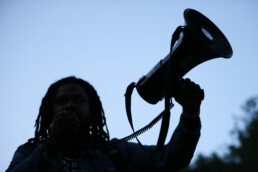The Inside Woman at the Obama White House
Social secretary Deesha Dyer is sharing her real life behind the scenes—her imposter syndrome, her abortion, and what she wants young Black women to know.
BY REBECCA CARROLL
Back in 2009, as a 31-year-old part-time community college student inspired by the election of America’s first Black president, Deesha Dyer applied on a whim for a White House internship. Much to her astonishment, she got it. She went on to become the White House social secretary during the last two Obama years, curating large-scale events, meeting royalty, the Pope, and her hip-hop heroes. She managed her spectacular successes while fighting off a severe case of imposter syndrome and dealing with the daily microaggressions a Black woman faces in the historically whitest of houses. Dyer tells her extraordinary story in her new memoir, Undiplomatic: How My Attitude Created the Best Kind of Trouble, and we sat down to talk about all of it.
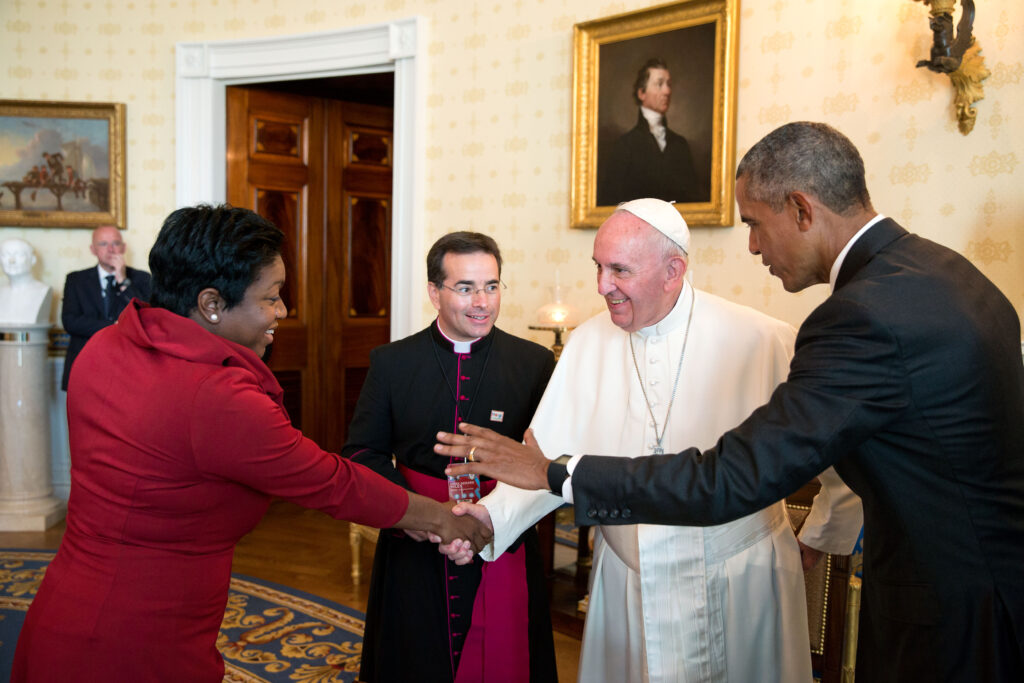
Rebecca Carroll: For many people, but especially for Black folks, the Obama years were not just an eight-year presidency; they were an era, like the Harlem Renaissance or the Black Arts Movement. It was a collective glory. What was it like to be such an integral part of that?
Deesha Dyer: What made it so wonderful for me is that I wasn't in this world before, so I had no preconceived notion. The same wonder I had when I started encountering [Barack Obama] on my television in 2007 was the same way I was for eight years.
Yes, they were President and First Lady, but also they were Barack and Michelle Obama—community activists, Black folks who had student loans at some point. It was an everyday tussle in my head of being like, “Remember, they're President and First Lady; they're not just Barack and Michelle.” I wanted to look at them as regular people, but I had a job to serve them. And they are people that I respect and revere. To this day, sometimes Barack Obama will joke with me, and in my head, I'm like, “Oh my God, I’m living this moment, I'm a witness to this,” and it's just a joy.
In your book you write that you identified with President Obama’s non-traditional family background. Can you talk a little bit about why that is?
Number one, we always saw white presidents—but also, when I got to know Barack Obama's background, it was just like, “He didn't have a mom and dad both in the home; he lived with his sister, and he lived in Hawaii. He moved around, so it wasn't like this cookie-cutter background.” [Dyer spent most of her childhood away from her parents while she attended a boarding school for low-income students.] And I had that excitement like, “He understands what some of us go through…This person will maybe get some things that are not traditional.”
One of the very real joys of your book is its realness and humor. When you write about your interview with Mrs. Obama for the job of social secretary, and she asks you how you’re doing—I mean, you were all of us when you said in your head: “I am out here fighting for my life!”
I’m fighting for my fucking life! Like, “What do you mean how am I? How would you be sitting here for an interview with Michelle Obama?! How would you be sitting with yourself? Clearly, I'm not okay.” I can see it like it was yesterday.
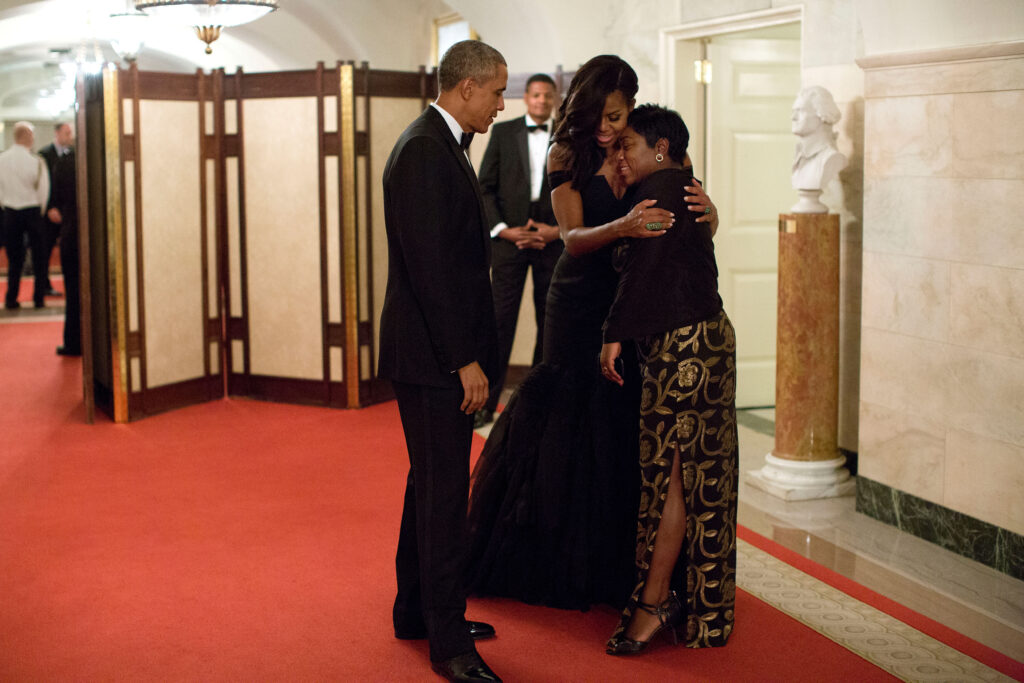
Were there other instances with Mrs. Obama that you left out of the book and might want to share?
Oh, there were millions. But [she] would always tell me to tell my story. One time, we were in Miami, and I was working, so I wasn't at the dinner table. She said, “Deesha, come over here, sit down, and tell them your story.” And I'm like, “Erm.” I knew her friends, but I held a very clear distinction: If I'm working, I ain't drinking. I'm over here. When y'all leave, that's when I'll eat and drink, right?
We had a lot of just small moments, fun moments, laughing moments. She's a human being, but she's also one of these people that—you prepare for a meeting with and think you’ve thought of everything, and she asks the one thing you didn't think of.
You write very candidly about having had two abortions, one while you were working at the White House—ironically, you wrote, just after you met the Pope. You say that that second abortion ended up being kind of a breakthrough in your life. Did that surprise you?
It really did, because I was still very thick in the imposter syndrome: “I'm a fraud, blah, blah, blah.” When I had the abortion, there were no regrets. I've always been on the side of reproductive rights. I had a medical abortion, so I did it at home. But I went back to work when I was still bleeding and wearing Depends. And I was just like, “What the literal fuck am I doing here with a fucking diaper on? This is crazy.” That breakthrough for me was huge because I just couldn't believe that I thought I had to go back to work wearing a diaper after an abortion.
Because if you didn't, it would further fuel your sense of fraudulence?
One hundred percent. The culture of work is different now than it was then, and I think I was afraid somebody would be like, “Why is she taking [time] off?” And so, I was like, “I'm going to go back just to prove I can do it.” Because when you're in your fraudulence, you do anything to prove that you can handle it. Which is why we see Black women in the workplace with hair loss, diabetes, high blood pressure, and strokes: because we're trying to prove that we're not a fraud, that we're supposed to be there, that we can handle it.
It's the way in which imposter syndrome is so symbiotic with the historical stereotypes that have been put upon us.
Say that! I know that we've come very far with mental health and workplace culture, but please. If a Black woman is like, “I'm going to take some time off,” when you come back, it’s like, “Are you okay?” Treating me like I'm a child. I never really [encountered] anybody who did that in the White House, but it still was the White House. It was still people [who did not believe] I could do the job. And so, I thank goodness something didn't happen to me because I would’ve probably died for that job. For what? Now, I'm like, “No.”
We were talking earlier about your abortion—how surreal is it now to think about having had an abortion while at the White House, which is two miles from the Supreme Court where Roe was overturned?
I'm not surprised, especially given the last President [and his] Supreme Court justice [appointees], but I would say I'm angry. I'm angry in a way that makes me have to watch my wellness. As somebody who's had abortions and somebody who has a fucking vagina and ovaries and everything else, it's kind of just like, “How are we so discounted that we can't make our own decisions?” It's the reason why I talk about [my abortion] in the book: I want people to understand that abortion is a normal thing. We have sex, and [if] we don't want to have children, we have abortions. Let's move on.
But did I think we would ever be here? I don't think I did. But when Trump came, I knew it was a possibility. I remember running to my OBGYN and getting my IUD because I knew what was going to happen. I got it in February 2017 before I lost my federal health insurance, and I was like, “Let me get the real good one, the one that will last through his presidency.”
By the way—and I don’t know if this is a spoiler or not—but I didn’t realize that the whole Melania Trump bringing a gift for Mrs. Obama on the “transition of presidential power” day was an act of defiance. Everybody saw Melania step out of the car holding a blue Tiffany’s box, and that it was immediately awkward when she handed it to Mrs. Obama, but you write that you had actually confirmed with Trump’s team that there wasn’t going to be a gift exchange.

Yeah, we confirmed that there were no gifts coming. Otherwise, we would've planned for me to be right there so she got it. But you could see on Mrs. Obama's face like, “Damn.” Legit like, “What's happening? What are we doing here?” I think that was [the moment] for me when I was like, “I'm done. This is it for me. These people have lost their everlasting fucking minds.” How do you come up here with a fucking Tiffany's box? Are we sponsored by Tiffany’s? But it was also so on-brand for them.
I understand what you mean by on-brand, but even so, why do you think [Melania Trump] would do that?
I'm going to be for real. I don’t think Mrs. Trump had a clue. I honestly think she had no idea about the protocol. I think she was shocked to be there. I think they were both shocked to be there for all four years. I think maybe they knew where the White House was, but that's about it. I don't think that they had any idea [about protocol], but their team should have known.
In keeping with our idea of fighting and wellness, your story includes a lot about your “unexpected path,” and I wondered how your definition of an expected path has changed since you worked in the White House.
My definition has changed in the sense that I don't have one anymore. But I think that the world's definition is still the same. There aren't a lot of companies that are going to hire somebody with great experience and no college degree [as the Obamas did with me].

Just to bring it full circle: Towards the end of the book, you write about an experience you had after the White House where you thought you had this new gig you’d applied for in the bag, but you didn’t get it. You were very hard on yourself about that, and I thought you could have been kinder.
The first thing I did [when I didn’t get the job] was go back to the comfortable place of, “You did that all wrong.” [That experience] did knock me down, but it didn't keep me down. Before, I would be like Eeyore; I would just wallow in it. But [this time], I was like, “Okay, let me wallow. All right, let's go get a drink.” I want to be real with people; I'm not going to pretend that I don't still have these [feelings of doubt] that come and go. But I know how to manage it better, and I think that I am more kind to myself.
But this also goes back to the whole notion that Black women are only recognized if we’re Beyoncé or Breonna Taylor— either a superwoman or a statistic. It's like, can we have some middle ground?
Can we just exist? And in any which way we want to? Sometimes we want to be a superhero, and then sometimes we're like, “No, I want to sit at home and watch movies all day.” For so long, I thought [that desire] was me being lazy or wrong. No, fuck that. Now I'm laying in this bed, child.

Rebecca Carroll is a writer, cultural critic, and podcast creator/host. Her writing has been published widely, and she is the author of several books, including her recent memoir, Surviving the White Gaze. Rebecca is Editor at Large for The Meteor.
What the Columbia Protests Teach Us
 April 23, 2024 Shalom, Meteor readers, Happy Passover to those who celebrate and a felicitous Tuesday evening to those who don’t. Religious fun fact for you! There probably wouldn't be a Passover were it not for two very smart and brave women: Jochebed and Miriam, mother and sister of Moses. They really don’t get enough credit for saving Moses’ life, ya know. In today’s newsletter, we take a look at the student-led protests across college campuses and find out what stay-at-home parents are really ✌️worth ✌️. Shannon Melero  WHAT'S GOING ONTents on campus: Over the last week, an increasing number of student groups on college campuses across the country have staged major protests calling attention to the ongoing attacks on Gaza and demanding the schools’ administrations divest from Israel. Students at Yale, NYU, MIT, and Columbia have been arrested; at Columbia, where over 100 students were arrested—some temporarily evicted from their dorms—faculty walked out, objecting to the fact that the university president had called the NYPD.  STUDENTS WITH THEIR TENTS AT THE COLUMBIA ENCAMPMENT (VIA GETTY IMAGES) A lecturer from the law school told the Guardian that the police presence felt “completely unnecessary” and that “this was by all accounts a non-violent protest.” Not all students (from various campuses) agree: One student from the University of Michigan told CBS, “It's scary, it's terrifying. The sign says, 'Long Live the Intifada' ... not a comfortable feeling.” But student organizers at Columbia released a statement saying, “We firmly reject any form of hate or bigotry and stand vigilant against non-students attempting to disrupt the solidarity being forged among students—Palestinian, Muslim, Arab, Jewish, Black, and pro-Palestinian classmates and colleagues who represent the full diversity of our country.” (It’s also worth noting that Columbia’s own Human Rights Institute released a statement confirming that the protests were non-violent.) If like the students at the Columbia encampment last night you find yourself marking Passover at a protest or at home with family or friends it is a unique time to be doing so, considering the holiday’s deep roots in the struggle for liberation and lessons on mercy to outcast peoples. One Passover tale involves flinging the door open and declaring “All who are hungry come and eat!”—poignant words in the face of Gazans’ forced starvation. As Rabbi Elliot Kula wrote in TIME, “Solidarity is not just a pretty word, but a powerful tool we need to leverage in this time.” AND:
 FOLLOW THE METEOR Thank you for reading The Meteor! Got this from a friend? Subscribe using their share code or sign up for your own copy, sent Tuesdays, Thursdays, and some Saturdays.
|
![]()
They Waved Her Underwear in Front of a Jury and Called Her a "Slut Puppy"
THEY WAVED HER UNDERWEAR IN FRONT OF A JURY AND CALLED HER A "SLUT PUPPY"
Now Brenda Andrew is on death row, and the Supreme Court could weigh in
BY NEDA TOLOUI-SEMNANI
The U.S. Supreme Court will decide this Friday if it will hear the case of Brenda Andrew, the only woman currently on death row in Oklahoma. The Andrew case is the second Oklahoma capital punishment case vying for the court’s attention this term, and it has potentially far-reaching ramifications—not just for the state, but for the rights of women and queer people everywhere.
The background on the case is this: Andrew, along with James Pavatt, her former partner, were found guilty of first-degree murder in the 2001 shooting death of Andrew’s estranged husband, Rob, but the jury rejected the state’s charge that Andrew would be a “continuing threat to society.” Nonetheless, both Andrew and Pavatt were sentenced to death. Throughout Andrew’s 2004 trial, her sexuality, her dress, her demeanor, and, ultimately, her behavior as a wife, mother, and Christian were dissected and condemned. In an amicus brief filed with the Supreme Court, a former federal judge, 17 law professors, and four domestic violence advocates argue that the Andrew case was rife with gender bias that unfairly prejudiced the jury against her.
“At a time when women’s rights generally are on the chopping block—also the rights of queer people and civil rights of minority communities—we’ve got a case that’s at the extreme end of what it means when we dehumanize these communities when we strip people of their humanity,” says Nathalie Greenfield, a lawyer with the non-profit firm Phillips Black, which filed the writ of certiorari to the Supreme Court on Andrew’s behalf. She argues that if the Supreme Court does not review the case, the justices would sanction using “assumptions, stereotypes, and tropes about people who dare to transgress perceived norms,” especially when it comes to gender, race, and identity.

The trial transcript, for example, reveals that witnesses were encouraged to describe Andrew’s appearance in detail, from her dresses (“very tight, very short, with a lot of cleavage,” said one) to her make-up choices (“gothic”), and also to say whether they thought those choices were appropriate. Prosecutors also waved Andrew’s underwear in front of the jury and called her a “slut puppy,” one of the last things members of the jury heard before they began to deliberate.
“There [were] just so many recorded instances of gendered evidence being presented every single day [of the Andrew trial],” says Greenfield. “And a lot of this was about her appearance and her extramarital affairs. The focus was on the fact that this was a woman who was transgressing gender norms by not being this chaste Christian wife.”
Oklahoma is a particularly deadly state: It has executed 124 people since 1976, when the U.S. lifted its moratorium on capital punishment. (Only Texas has killed more people.) Of these, just three were women—two of whom were prosecuted by district attorney Bob Macy, who is considered the second deadliest prosecutor in United States history. He’s responsible for 54 death sentences—more than any other prosecutor who was practicing law between 1980 and 2001. He resigned in 2001 after evidence of prosecutorial misconduct was found in 18 of those 54 cases, resulting in three exonerations.
However, his shadow still stretches over Oklahoma’s justice system—and Macy’s assistant district attorney and protege, Fern Smith, was a prosecutor in the Andrew case. According to transcripts, Smith repeatedly asked witnesses to describe Andrew’s dress, opine over Andrew’s behavior, and state whether or not Andrew was, in Smith’s words, a “good mother.”
This isn’t the first time a case Smith has prosecuted has been challenged. She has been repeatedly accused of failing to disclose exculpatory evidence—evidence that could be favorable to the defendant—and even of destroying evidence. In fact, she was accused of prosecutorial misconduct by name in the case of Richard Glossip, the other Oklahoma capital punishment case that will be in front of the U.S. Supreme Court this year.
At a time when women’s rights generally are on the chopping block—also the rights of queer people and civil rights of minority communities—we’ve got a case that’s at the extreme end of what it means when we dehumanize these communities when we strip people of their humanity.
The Supreme Court has already delayed deciding whether to hear Andrew’s case twice. Tomorrow, they could do one of three things: agree to hear it, decline to hear it, or “vacate and remand,” which means the Supreme Court could return her case to the appellate court to reconsider without hearing an oral argument.
Since Andrew was sentenced, she has been the sole woman on death row; consequently, she has served the majority of her sentence—more than 16 years—in solitary confinement. According to the United Nations, prolonged solitary confinement, or more than 15 days without meaningful human contact, is defined as torture.
In February 2020, Andrew was moved to the general population, where, according to her lawyers, she thrived. She got a job and joined a quilting circle. In January, two days after her attorneys filed the writ of certiorari with the Supreme Court, Andrew was returned to solitary. She wasn’t given a reason.
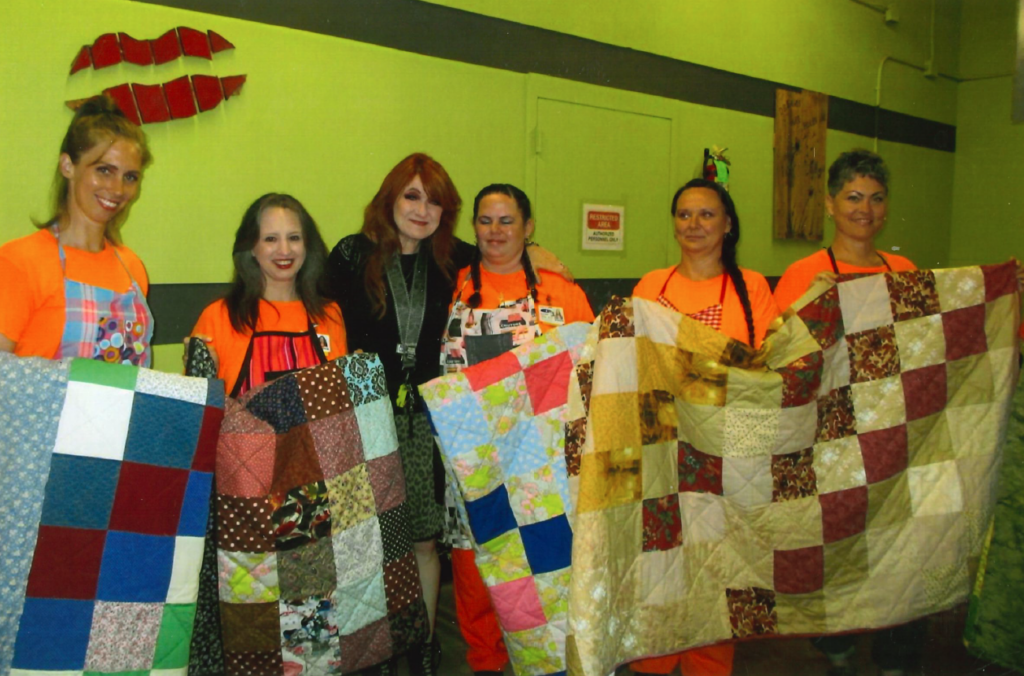
“The gender bias is just so finely woven into the trial that you can’t extricate it,” argues Jessica Sutton, another attorney with Phillips Black. “It’s unique in that way. However, the real issue implicates the due process clause of the 14th Amendment. We have to ensure that trials are fundamentally fair. We want to make sure that, for the ultimate punishment, we have a reliable trial, a reliable process, a reliable conviction, and sentencing. What the prosecution did is undermine every aspect of the entire trial.”

Neda Toloui-Semnani is an Emmy-winning journalist and the author of They Said They Wanted Revolution: A Memoir of My Parents.
SCOTUS Just Made Protesting Much Harder
|
Evening, Meteor readers, Before we get any further away from the afterglow of March Madness, I must congratulate our top bracketologist, Em, who is getting a brand-new Meteor tote. They had this to say about their unexpected victory when I contacted them with the news: In today’s newsletter, we dig into a ruling targeting protest organizers, talk more basketball, and share a warning about the importance of oxygen. Looking forward to the regular season, Shannon Melero  WHAT'S GOING ON Freedom of assembly? Not for everyone: If you’re a protest organizer in Mississippi, Texas, or Louisiana, your life got a lot more complicated last Friday after the Supreme Court declined to hear a lower court case out of Louisiana: Mckesson v. Doe. The case is super layered, so let’s break it down. The question at the heart of the case, which was first heard in the Fifth Circuit Court of Appeals, is whether or not a protest organizer can be held financially liable for the actions of an attendee who does something illegal. The organizer named in the suit is DeRay Mckesson, the famed blue-vest-wearing Black Lives Matter activist (and podcast host) who organized a protest outside a Baton Rouge police station in 2016. During the action, a police officer was struck by a rock thrown by an unknown person who was present. There is no evidence that Mckesson himself injured the police officer; the accusation is that he created an environment that allowed for the officer to be injured. In the eyes of the conservative Fifth Circuit, Mckesson is financially liable for the illegal actions of this unknown assailant. But the legal logic to justify that is…loose. Under a 1982 court ruling in the case of NAACP v. Claiborne Hardware, protest organizers can only be held liable if evidence finds that they incited illegal activity through speech or authorized illegal action by attendees. But adhering strictly to that ruling would have let Mckesson off the hook, so the Fifth Circuit—with six Trump appointees—went further by adding an extra (intentionally vague) rule to the list of ways organizers can be found liable. According to this court, “The First Amendment does not apply ‘where a defendant creates unreasonably dangerous conditions, and where his creation of those conditions causes a plaintiff to sustain injuries.’” Because Mckesson’s protest blocked access to a police station and a public highway (a very common tactic in direct actions), he created “unreasonably dangerous conditions” and is therefore liable. As one judge on the Fifth Circuit who wrote a dissenting opinion on the ruling noted, the decision would unfairly make organizers liable for “the unlawful acts of counter-protesters and agitators.” Without action from SCOTUS, the ruling won’t be overturned, and any future organizer in Texas, Mississippi, or Louisiana will face great financial risk for anything that happens at their protest. While this doesn’t all-out ban protesting, it certainly makes it much harder to organize. The move couldn’t come at a worse time. Protestors have taken to the streets over abortion rights, trans rights, and climate change over the last year, and just yesterday, protestors in California, Oregon, and New York blocked major roads to call for a ceasefire in Gaza. If you’re organizing a protest over any issue and want to know your rights, learn more here. AND:
 CLARK AND WNBA COMMISSIONER CATHY ENGELBERT (VIA GETTY IMAGES)
 FOLLOW THE METEOR Thank you for reading The Meteor! Got this from a friend?
|
![]()
Ye Olde Abortion Ban Hits Arizona
|
Greetings, Meteor readers, I’m in for Shannon today, so you’ll have to wait until next week for your sports (and the results of our March Madness bracket, which she very much wants to announce personally). Today, we’re talking about that Ye Olde Arizona abortion ban in the Grand Canyon state, what O.J. Simpon should be remembered for, and a few weekend reads. Fare thee well, Samhita Mukhopadhyay  WHAT'S GOING ONHistory lessons: On Tuesday, the Arizona Supreme Court revived a zombie law from 1864 that would ban nearly all abortions in the state. The law stipulates that “a person who provides, supplies or administers to a pregnant woman, or procures such woman to take any medicine, drugs or substance” for the purpose of abortion could be prosecuted unless the pregnant person’s life is at risk. The current Attorney General of Arizona, Kris Mayes, has courageously said she will not prosecute people under what she has called a “draconian” law. Meanwhile, former gubernatorial candidate/current Senate candidate/die-hard election denier/Trump superfan Kari Lake, who enthusiastically endorsed this law during her governor bid, appears to be trying to distance herself from it. (I wonder why?) In trying to make sense of the resurrection of a law written before slavery was abolished or women had the right to vote, we talked to our resident abortion storyteller, historian, and host of “The A Files,” Renee Bracey Sherman.  A PROTESTOR AT A WOMEN'S MARCH RALLY IN ARIZONA (PHOTO BY MARIO TAMA/GETTY IMAGES) The Meteor: What is something about Arizona law and its roots in the Civil War era that you feel the average person is not fully grasping? Renee Bracey Sherman: I think many people are upset because we can see how different society is today from how it was in 1864. Black people were not considered full humans. There were laws against interracial marriage. Most of us couldn’t own property—in fact, we were property in the eyes of the law. Anyone can look around and see that we should not be using this standard to regulate our society—let alone medical care—so it feels outrageous. But Arizona is not the only state like this. When Roe was overturned, several states automatically reverted to their abortion bans from the 1800s. That part isn’t new, and people live under those laws now. What feels surprising for Arizona is that unlike Michigan, which took the opportunity to repeal their outdated laws, or Wisconsin, which is currently challenging theirs, the Arizona State Supreme Court thought [the law] could be implemented now. It’s like they didn’t look outside and check the temperature of our nation. They ignored the clear message from the last few elections that people want access to abortion. You noted that by today's standards, the original law would technically ban second- and third-trimester abortions, but it's being used to ban abortion completely. How is it possible that the law isn't being interpreted as it was written but can still be revived today? Courts are made up of people who make decisions—sometimes bad ones. They don’t have to follow the historical accuracy of the law. Everything is based on their interpretation. Not to mention: language changes. Regina and I talk about these language changes on our podcast. What we consider an abortion today—the intentional termination of a pregnancy—and when [that abortion] is possible is because we now have the ability to detect a pregnancy earlier than we did 160 years ago. But back then, [abortion laws] generally referred to the ending of a pregnancy after “quickening,” or the moment when the pregnant person could feel the fetus move, which is during the second trimester. So, one could argue that the law should only be applied to later abortion, but again, it’s up to the Court’s interpretation. And that doesn’t help us because a ban on any aspect of abortion is a ban for all of us. This is why abortion should not be left up to the courts and must be decriminalized and available for everyone throughout pregnancy. What happens next for Arizonans? What can we do to fix all of this? The advocates on the ground are doing a lot right now. They have two weeks to challenge the State Supreme Court’s ruling before it goes into effect. Abortion funds and clinics are trying to care for as many patients as they can and figure out whether they would like to continue providing care in defiance of the State Supreme Court’s ruling. State legislators are looking to try to repeal the ban but so far have been unsuccessful. The Governor and Attorney General are looking at all of the options they have at their disposal. Advocates are currently gathering signatures for a statewide ballot measure protecting abortion in the state constitution, so we’ll see how that plays out over the summer and into November. And, of course, all of this is complicated by voter disenfranchisement, which Regina and I talk about in our podcast interview with LaTosha Brown. But at the end of the day, while these are important fixes, it’s not addressing the larger issue that abortion decisions and care should not be left up to the government, courts, or popular vote to decide. As we rebuild, we need to envision a way to protect abortion access for everyone that isn’t dependent on a few judges and their inability to understand historical context or society today.  O.J. SIMPSON IS SHOWN DURING TESTIMONY IN HIS CRIMINAL TRIAL FEBRUARY 9, 1995. (PHOTO BY LEE CELANO/WIREIMAGE) O.J. Simpson’s real legacy, as told by bell hooks: There is going to be a lot of ink spilled about the passing of football star O.J. Simpson, who was acquitted of killing his ex-wife Nicole Simpson and her friend Ron Goldman almost 30 years ago. Simpson’s low-speed car chase and subsequent trial was a cultural flashpoint: Would a black man accused of killing a white woman be able to win in our racist criminal justice system? This was the narrative invoked by legal mastermind Johnie Cochran to convince the nation that a man who had allegedly abused his wife was not her killer. But Black feminists didn’t fall for it: bell hooks said to Charlie Rose in a 1995 interview that she hadn’t watched the trial, but while America made it about race, at its core, Simpson’s trial was also about upholding the patriarchy. “Once this becomes entertainment, once the cameras focus on O.J. Simpson,” she said, “people will forget that at the heart of this is both male violence and male violence against women.” AND:
 WEEKEND READS 📚On babies: Women are having children later. What does it mean? (TIME) On throuples: Three literary stars found love together. And now they are having a baby. (New York) On feminist history: In light of O.J. Simpon’s death, writer Moira Donegal re-upped this must-read Andrea Dworkin essay on Nicole Simpson’s murder. (Evergreen Review)  FOLLOW THE METEOR Thank you for reading The Meteor! Got this from a friend?
|
![]()
"I'm Here As Long As I Can Be"
"I'M HERE AS LONG AS I CAN BE"
Texas abortion provider Ghazaleh Moayedi, D.O., provides care for her neighbors—but she has to leave the state to do it
By Susan Rinkunas
After Ghazaleh Moayedi graduated college, she got a job working on the administrative side of Whole Woman’s Health, an abortion clinic in Austin, Texas. She respected the providers who chose the work—many of whom had witnessed illegal abortions before Roe v. Wade—but also thought the patients deserved doctors who looked like them. “I didn’t have the language for it at the time,” she says “But I noticed these doctors, older white men, didn’t reflect the people that we were taking care of. I knew that we needed new doctors.”
So, she went to med school and became an OB/GYN and complex family planning specialist in Dallas in 2018. Less than two years later, Texas lawmakers enacted abortion bans, first during the height of the pandemic, and then via the 2021 bounty hunter law known as Senate Bill 8. A few months later, Roe fell, and now Moayedi travels to Kansas to provide abortions—often to other Texans. I talked to her about what she’s doing to care for people after they return home, and her message for people living in Democratic-led states who think they’re safe from abortion bans.
Susan Rinkunas: When did you start traveling to provide abortion care?
Ghazaleh Moayedi: I started traveling to Oklahoma in 2020 [after] Gov. Greg Abbott shut down abortion care in our state under the guise of COVID restrictions. Abortion doctors traveling is common—but never from a state like Texas to somewhere else. That is the novel piece over the last few years. It’s always a doctor who lives on one of the coasts traveling to a restrictive state. That was a moment where I was like, ‘Oh, crap. In order to take care of Texans, I’m gonna have to start traveling.’ I started working at a couple of clinics there, in addition to the clinics I was working at in Dallas, and did that until Oklahoma shut down—it was about a month or so before Dobbs. Now, I am traveling to Kansas and working in a clinic there.

You’ve said it’s surreal to be a Texan leaving the state to care for other Texans leaving the state. Are you commiserating with patients? Do they know you’re from Texas?
I usually ask people when I make small talk when I’m doing an ultrasound. Like, “Where are you coming in from?” And people usually say Texas, then I ask where. “Oh, where in Dallas? I’m from Dallas, too, that’s why I’m asking.” I can just see people’s faces change. When I say, “Did you eat at that place? That place is really good,” I can see the light coming from people. It’s a moment for us both. We’re like, “Yeah, this is bullshit. It’s totally bullshit that we’re both here.” I had a patient who was like, “I wish you could have just done my abortion in the closet at this restaurant that we both knew.”
During a fall trip to Kansas, two of my patients were on the same flight I took. I’ve still been really processing that in and of itself, that we’re all on this flight together, how just stupid, pointless, [and] inhumane this is.
Are there certain patients you can’t stop thinking about?
I’ve had patients whose partners have lost their jobs because of the time they have to take to come and travel. There’s a ripple effect of harm that happens from people needing to travel to get abortions.
When someone does a medication abortion [as Dr. Moayedi sometimes does for Texas patients in Kansas], there are rare cases where it doesn’t work. If I’m seeing them in Texas for an ultrasound afterward but there’s still a continuing pregnancy, it’s like, “Shit, you’ve gotta go out of state again.” I can’t do anything for them, and it’s unconscionable. Before [Dobbs], someone would show up a week after their medication abortion, and I could be like, “Yep, everything looks good” or, “Nope, it didn’t work. Okay, I can do an aspiration right now for you.” Now, it’s a never-ending saga.
In other states [like Kansas], it’s “take your medication abortion, and then in five weeks, take a pregnancy test.” Some of these people are waiting five weeks to be able to fully confirm that their abortion is complete. Not only did they have probably several weeks of waiting to get an appointment, get out of state, then do their pills, then come back—but now they’re going to have to wait another month to know that it’s complete. This is like a two-month minimum cycle in someone’s life of just trying to end this pregnancy.
I’m definitely seeing people making that calculation [about medication abortion] in their mind of, “Wait, then I have to wait to know that it’s done?” They’re so stressed out—they had to do all this travel—that they’re like, “I’m just gonna do a procedure [instead] so I can leave here knowing.” You take good care of them, but states are taking people’s autonomy away, and they’re being forced to make decisions out of this insulting process.
And you’re providing ultrasounds in Texas now?
After a Dallas abortion clinic closed in spring 2023, I started a little ultrasound practice so that, at least for folks in my general area, people don’t have to wait five weeks [to find out if their pills worked]. They can get an ultrasound with a trusted provider who isn’t going to judge them and who has deep experience in abortion care.
People really need a community-based provider that they can turn to when they come back [from an out-of-state abortion], someone that they can trust and talk to. It sucks not being able to provide abortions [in Texas]. But it is this whole new chapter of my work. It feels really good to still be able to take care of people in the ways that I legally can.
I mean, folks are going to crisis pregnancy centers for ultrasounds before and after abortions because they’re free. People are able to schedule appointments with me via Pegasus Health Justice Center. I have a cash rate that’s $250, but I’m working with abortion funds, and pretty much everyone is able to get funded.
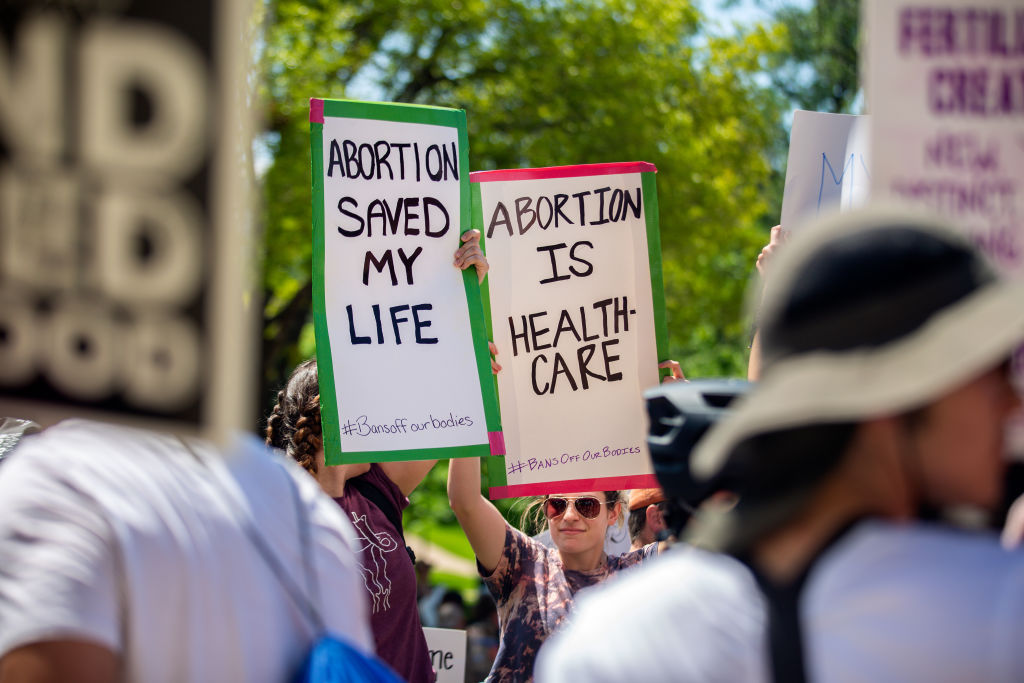
Have you thought about leaving Texas?
There isn’t such a thing as a safe state. We are one country, and these types of tactics are coming to every state. This mentality isn’t concentrated here [in Texas]. It exists in states without abortion restrictions as well. But people have this false belief that they are safe in these bubbles, and even within states like California and New York, the [anti-abortion] mentality exists. This extreme right, fascist, white-power movement exists everywhere, and abortion restrictions are an extension of that—they’re not separate from it.
After the Dobbs decision, I was feeling really low, even though we knew it was coming. It was like, “What the hell am I gonna do?” I considered moving and told my friends. I started looking at Zillow everywhere, like, “What’s New Jersey like? What’s Michigan like?” I interviewed for a few jobs in other states, and that was a couple of months of pouting and wondering what I was going to do. But I’m not going to escape from white supremacy anywhere in this country. I can move somewhere else and have a little bit more leeway in my work, but until when? We might have a president that is literally presidenting from jail.
Right, there could be a national abortion ban in January 2025.
Exactly. The reality is, I could pick up and move my whole family, and we could go somewhere “safe” for a period of time—and then what? I’m here as long as I can be. I think the idea that this is concentrated [in Texas] is really short-sighted. Everyone has a role to play in combating white supremacy and fascism within their own communities.
There’s a ripple effect of harm that happens from people needing to travel to get abortions.
What do you think of the talk online where people urge doctors to defy hospital orders and perform abortions in health emergencies?
It makes me incredibly annoyed and pissed off. That’s not how hospitals work. It’s not like I can just waltz into an operating room and say, “I am ready to do a surgery now.” Even when any hospital I worked at allowed it, there were still often multiple hoops I would have to jump through. Sometimes, even though it met all of the policy guidelines, there was someone who delayed the case because they needed to talk to someone who needed to talk to someone.
Doctors don’t own the hospital. We don’t actually direct anything in the hospital or schedule cases. There are multiple layers of people that have to approve things and even once it is approved, financially and policy-wise, you can still show up on that day and your anesthesiologist refuses, the nurse refuses, the tech refuses. I can’t do it alone in a hospital. I
could go to jail. I could lose my medical license, and then who am I going to help?
And rather than suggesting medical providers flout state laws, there are people organizing community networks for abortion pills, like Red State Access.
What pill networks are doing—that’s envisioning the future and being the future that we want and doing the work that needs to be done at the community level. That is how we change culture. That is how we address people’s needs in the moment, and we live out the future that we want. We’re saying we don’t need the courts to let us live the free lives that we can have. We actually have autonomy over ourselves.
That is, on all these micro levels and within communities, what people need to be doing: envisioning and living within the just future that we all deserve.
The Abortion Pill on Trial
NEWS
One of its key researchers says Mifepristone was tested “with three times or more rigor” than other drugs.
BY SAMHITA MUKHOPADHYAY
Today, the Supreme Court heard oral arguments in the first abortion case to come before the court since it overturned Roe v. Wade. The case, brought by the extremist group Alliance for Hippocratic Medicine (AHM), is challenging the U.S. Food and Drug Administration (FDA)—specifically the FDA’s 2016-2021 policies, which expanded access to the safe and effective abortion drug mifepristone, initially approved in 2000 and now the most common abortion method across the country. AHM’s main argument? That the FDA did not adequately study mifepristone’s safety risks. (We explain it more in-depth here.)
The implications of this decision could be disastrous. As Fatima Goss Graves, President and CEO at the National Women’s Law Center, told us, “Banning mifepristone would upend abortion care not just in the conservative states that have been racing to ban it—but in all 50 states, no matter their laws.”
But the case itself is farfetched, argues Dr. Lisa Haddad, the medical director for the Population Council’s Center for Biomedical Research, the nonprofit research center that led clinical testing on mifepristone more than two decades ago. In fact, she points out, over 5 million people have successfully used it since then.
With the case now before the court, we spoke to Dr. Haddad and Dr. Beverly Winikoff, who worked at the Population Council for 25 years, where she was Program Director for Reproductive Health and Senior Medical Associate at the Council, which was the team that led clinical trials on mifepristone overseas. Now she serves as president of Gynuity Health Projects.
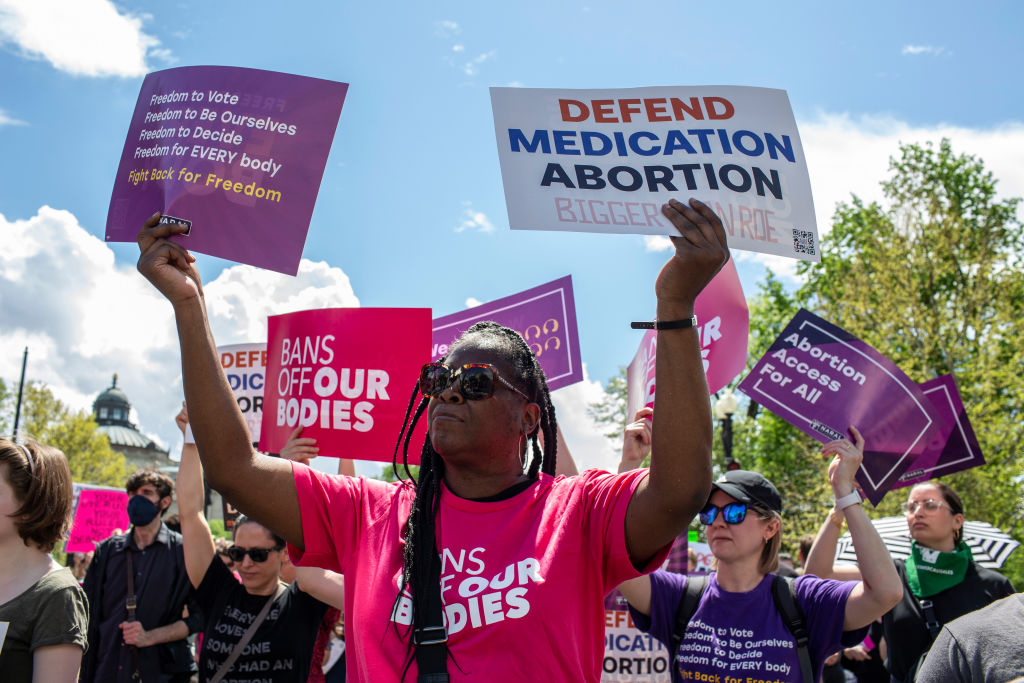
Samhita Mukhopadhyay: You worked with the organization that facilitated the FDA approval of mifepristone—what are you feeling right now?
Dr. Beverly Winikoff: I feel like I’m charging into the skirmish. I’m getting girded up. Can’t these people ever go away? But it is very, very encouraging to see how everyday people understand that this is a highly political, not a scientific discussion.
Dr. Lisa Haddad: I feel very frustrated and a little bit beaten up. And while I’m inspired by some of the voices speaking up in support of mifepristone, I see this trend in reducing access for women, and I’m scared that the science and the excellent evidence that supports this as a way to improve health outcomes will be overlooked and minimized. It’s a slippery slope.
BW: I think in the end, it’ll be okay because of the politics—the FDA is there to do a job, and it has always done it quite well in protecting the public. And this is an attack on the FDA. When you look at it that way, there are many people who are on our side, including big pharma—because if this happens, they have no [incentive] to be able to put money into new drugs because somebody could come up and decide that they don’t like that drug and they can [sue to] override the FDA, and that would be chaotic in the pharmaceutical world. It’s not just abortion; it’s every drug that gets approved. I think the politics of it is much bigger than abortion.
That’s a good point. Can you walk us through what we need to know about the FDA approval of mifepristone? Was it the standard approval process or was it a long, hard-fought win?
BW: It was cover-your-ass time the whole way along by the FDA. That was it. That was the theme. So, every single thing was done with three times or more rigor than any other drug I’ve ever heard of. But that’s okay because the drug is very good and very safe. We also got the FDA staff to be very excited about it. People were really very interested in making sure it got through.
When we did the final studies, we had several thousand people, and it performed very, very well. We were very attached to this product because it seemed safer and more effective than you could expect. So people were very excited about it because it had the potential to be a workaround for some of the political stuff of having to go to a clinic. You were doing it at home.
Dr. Haddad, can you speak to the significance of Tuesday’s case? Depending on the decision, what could the implication be?
LH: An increasing number of individuals are getting access to abortion only through medication abortion. I’m in Georgia, where we have a 6-week abortion ban. Finding out that you’re pregnant, making an appointment, getting off of work, getting a way to get there, and all of that before six weeks is hard. But if people make it to the clinic, medication abortion at that very, very early gestational age is a potentially good option for individuals, and the addition of mifepristone [generally used with misoprostol] enhances the likelihood of success. Also, without mifepristone, the barriers to access are huge. It’ll make it even harder for more individuals to obtain care.
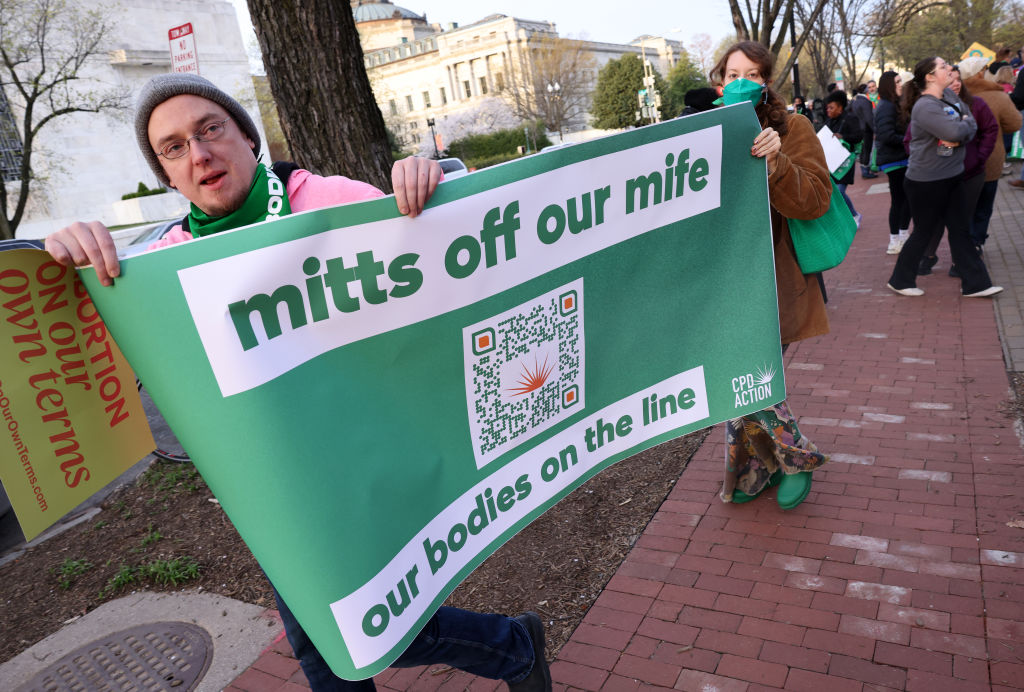
And what could this case mean for misoprostol?
BW: Well, one of the things that mifepristone does is soften the cervix. So that means that whatever’s coming out doesn’t have as hard a time. And there are a lot of pain fibers in the cervix, so it could be more painful to just use misoprostol. But you can do it for most people. It will work, but it’s not maybe as pleasant.
LH: An abortion with mifepristone is gentler on the body, it gives the person a little bit more control, and it’s more predictable in terms of how it’s going to go.
BW: What saves the day for some of these other drugs is that they have other uses. So methotrexate is also abortifacient, but nobody’s trying to take that off the market. Nor misoprostol, actually. [Methotrexate is used for cancer while misoprostol can be used to treat ulcers and to induce labor] And so I think one of the things is maybe to get drugs that have dual purposes.
LH: And there are opportunities for that. Mifepristone does have utility for other indications. There’s excellent evidence that it’s great for fibroids and that it can be used for contraception. There is evidence, and it’s used commonly as emergency contraception in many countries. It’s just not approved in the U.S., and so I wonder whether or not that would enhance its security.
BW: Yeah, somebody should put it in for approval.
LH: We’re actually trying to garner support to do that right now, Beverly. But again, the evidence in the [case] is ridiculous when you break it down. It’s challenging the ability of scientists to make a decision, but not on all issues, just an issue that bothers [the plaintiffs] morally. But it’s not based on science. It’s frustrating to see because just the fact that we’ve gotten this far—I mean, it shouldn’t have a foot to stand on, and yet it is at the Supreme Court.
BW: I think it’s a terrible thing for individuals—not just people wanting abortion, people who want to use drugs for anything.
LH: And even, I mean right now, the standard of care shows that the mifepristone regimen works better for miscarriage management. This focus on something that really shouldn’t even be questioned just highlights the [message] that women are not trusted, women need to suffer, and that doctors and scientists can’t be trusted. Also, on top of what Beverly said, I just want to highlight that it’s not just the FDA that says [mifepristone] is safe. All of the different medical agencies like ACOG and the Society of Maternal-Fetal Medicine, say that mifepristone is incredibly safe with very few adverse events. We know the risks are incredibly low, less than 0.3% of any sort of serious, major adverse events. The risk of death is almost non-existent, whereas if you compare that to forcing somebody to continue with a pregnancy, we know that those risks are.
Over 5 million people have used mifepristone for either medication abortion or miscarriage management. This is not something that is not well evaluated.
As of right now, medication abortion is still available. Learn more here.
"This Isn't Speedy or Fair"
NEWS
Lauren Smith’s Waited Over Four Years for Her Day in Court
By Neda Toloui-Semnani
Four months ago, I wrote in this space about Lauren Smith, a 32-year-old mother who lost custody of her youngest child in 2019 after she and her infant tested positive for THC, a cannabinoid substance, at delivery. Smith was arrested six months later and charged with felony child neglect for using marijuana while pregnant—a charge which, in Greenville, South Carolina, carries a sentence of up to 10 years in prison.
When we published the article, Smith’s trial date was set for the week of February 19, 2024, which was, rather poetically, five years nearly to the day after she had delivered and lost custody of her youngest daughter. The child has been living with her paternal grandmother since she was three days old.
But weeks before the trial was set to start, Smith learned her court date would be pushed for a third time. It is now scheduled for the week of April 22.
“Isn’t everybody due a speedy, fair trial?” Smith told me earlier this month. “This isn’t speedy or fair.”
The latest holdup comes after the Greenville County solicitor’s office entered more than 125 pages of new documentation into discovery. This is called a “document dump,” a legal maneuver in which one side enters hundreds, sometimes thousands, of pages of new documentation within weeks of trial in an effort to overwhelm the opposing side. (This is the second time the prosecution has used this delay tactic. The first was last May when they entered several hundred additional pages of documentation as discovery.)
Despite the U.S. Constitution guaranteeing the right to a fast trial, Stuart Sarratt, a former Greenville County public defender familiar with the Smith case, says, “South Carolina essentially does not have any kind of right to speedy trial.”
“We do on paper, but our Supreme Court has interpreted it as basically unless it’s been four-plus years, they’re not going to do anything about it,” he explains. “And really, you have to be in jail for them to really care about it.”
Smith has been awaiting trial for more than four and a half years. The Meteor’s requests for comment from the Greenville County solicitor’s office have gone unanswered.
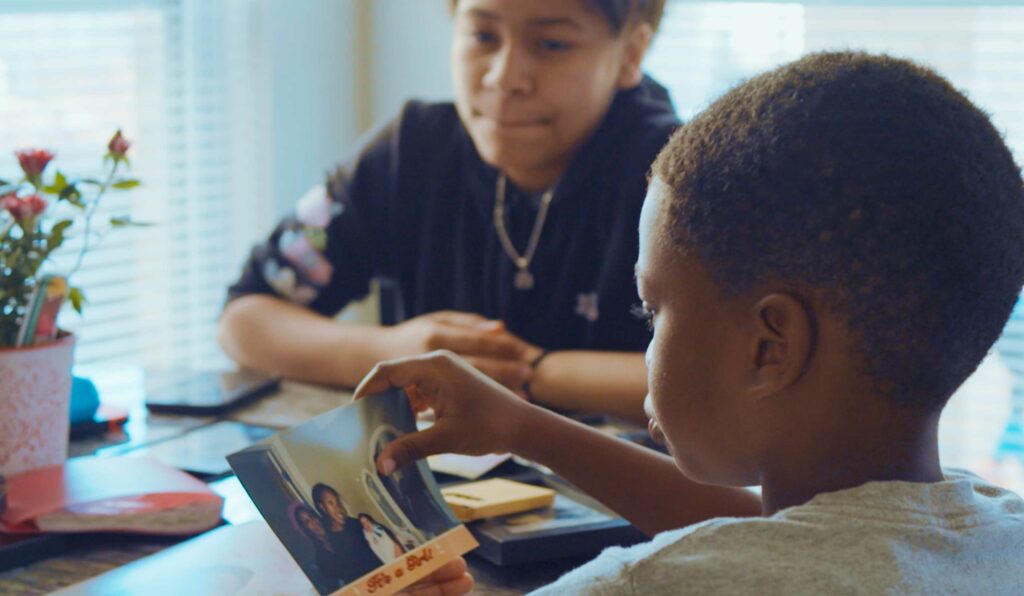
However, most South Carolinians—including the state’s Attorney General, Alan Wilson, a Republican—agree that the state’s judicial system is buckling under the weight of an extraordinary judicial backlog. Wilson is asking state lawmakers to expand his budget by $1.6 million dollars to help tackle the pile of serious criminal cases, including murders, that have been languishing for years. Against the backdrop of that backlog, state prosecutors, called solicitors, have a great deal of power over which cases make the trial docket. In Smith’s case, the prosecution proposed the trial date months in advance—but then introduced new documents within weeks of that date.
It is unclear what the prosecution hopes to prove with the entry of these documents, but they include medical records for Smith’s child. The Meteor has reviewed these records, which document her doctors’ visits from birth to the present; the most recent show that she was referred to and evaluated by an occupational therapist, who conducted a test to measure the child’s fine gross and fine motor skills—skills like grip on a spoon, object manipulation, physical reflexes, and other developmental milestones.
Advocates for parents like Smith have concerns about bringing records so long after pregnancy into a case. “The idea that your pregnancy-related conduct could be litigated when the kid is five or six, because, by some measure, they might not be hitting their milestones, feels so deeply problematic to me and not vested in any sort of understanding of causation versus correlation,” said Dana Sussman, the deputy executive director of Pregnancy Justice, a nonprofit who advocates for pregnant people caught in the criminal justice system.
The Meteor spoke to three occupational therapists, all of whom agreed that evaluations like the one listed above cannot diagnose why a child’s motor skills have progressed or been delayed.
“Children don’t meet milestones for all sorts of reasons and for no reasons at all,” Sussman notes. “I don’t think we know of a case right now that we’re working on that involves allegations that developmental milestones are not being hit, and therefore the mother deserves to be criminalized.”
As reported in the original piece, all American medical associations recommend abstaining from using cannabis and/or cannabinoid products during pregnancy and while breastfeeding, but the precise impact of marijuana use during pregnancy on the fetus and the child is both uncertain and under-researched. As outlined in the original story, Smith’s case is closely tied to the legal theory of fetal personhood and the ways the government is increasingly policing pregnant bodies (see the Alabama Supreme Court’s ruling on I.V.F. and so-called extrauterine children).
While Smith has been waiting for her day in court, she says, she’s been working at a nursing home and living with her mother and two older children. She tells The Meteor she hasn’t been allowed to see her youngest daughter since early November.
“This is half of a decade now of this back and forth, almost five years, and it’s just been continued and continued and continued,” Smith says.
Still, when asked where she sees herself in five years, she says her work with senior citizens, people who are at the end of their lives and have a long view of life, has given her both perspective and confidence. She plans to be a registered nurse.
Project 2025 is Genuinely Frightening
 February 22, 2024 Hola, Meteor readers, I am both excited and terrified for this weekend. On Saturday, I’m doing my first ever Polar Bear Plunge which, if you’re not familiar, is where people jump into the ocean in the middle of winter, sometimes for charity and sometimes for fun. (I am not in the latter group.) It’s going to be 37 degrees on Saturday. And did I mention I can’t swim?  In today’s newsletter, we dig into another thing striking fear in my heart: Project 2025. Plus, a win for menopausal Brits, student loan forgiveness for some, and your weekend reading list. Icicle-y yours, Shannon Melero  WHAT'S GOING ONWhat Project 2025 involves: Ever wonder what the Republicans would do if they secured the presidency this fall? Well, wonder no more because they’ve announced their plan to the world. Project 2025, as you may have heard, is an extensive “four-pillared” transitional plan to create a more conservative government. It’s long, it’s terrifying, and it’s real: Project 2025 wasn’t developed by some grassroots, far-fetched, no-name fringe group but by The Heritage Foundation, a conservative think tank and well-organized Beltway mainstay. So which action items do they want the next conservative president to pursue? Here’s the TL;DR on some of the suggested policies from their mandate book:
The core goal of Project 2025, as outlined in the “four promises” section of the mandate book, is to reform the government by enacting policies that prioritize the American family—which, out of context, sounds lovely. But in abundantly clear terms, the Project specifies that the American family it's referring to consists of two straight cis-gendered people, preferably ones who adhere to Judeo-Christian values. The authors of Project 2025 shape their agenda around conservative evangelical Christian teachings with the kind of precision the leaders of Gilead would envy. So, what have we learned from this glance into a literal conservative playbook? In the words of Whoopi Goldberg, “Molly. You in danger, girl.” We are all Molly right now. AND:
 LET'S (VIRTUALLY) GET TOGETHER!Doing anything fun on March 5? We are! The Meteor’s head of impact (and Mother of Swifties) Tara Abrahams will be in conversation with Chelsey Goodan, author of Underestimated: The Wisdom and Power of Teenage Girls, and award-winning filmmaker and Meteor collective member Sarah Jones. Join them for a discussion of the book—and the future young girls are working to create now. The event is totally free and you can register for it right here. See you in cyberspace.   WEEKEND READINGOn-screen, off the rails: Wesley Morris has written the only review of Jennifer Lopez’s new “film” you need to read. (The New York Times) On the front lines: Lawyers, patients, and advocates in abortion ban states are fighting tooth and nail to weaken those laws. But just how does anyone win that battle? (The Cut) On the court: Thousands of young girls dream of one day making it to the WNBA. And so does this very skilled 84-year-old baller. (The Athletic)  FOLLOW THE METEOR Thank you for reading The Meteor! Got this from a friend? Subscribe using their share code or sign up for your own copy, sent Tuesdays and Thursdays.
|
![]()
"I grew up thinking that most physicians were Black"
Uché Blackstock, M.D., on the conflicts and challenges of being a first
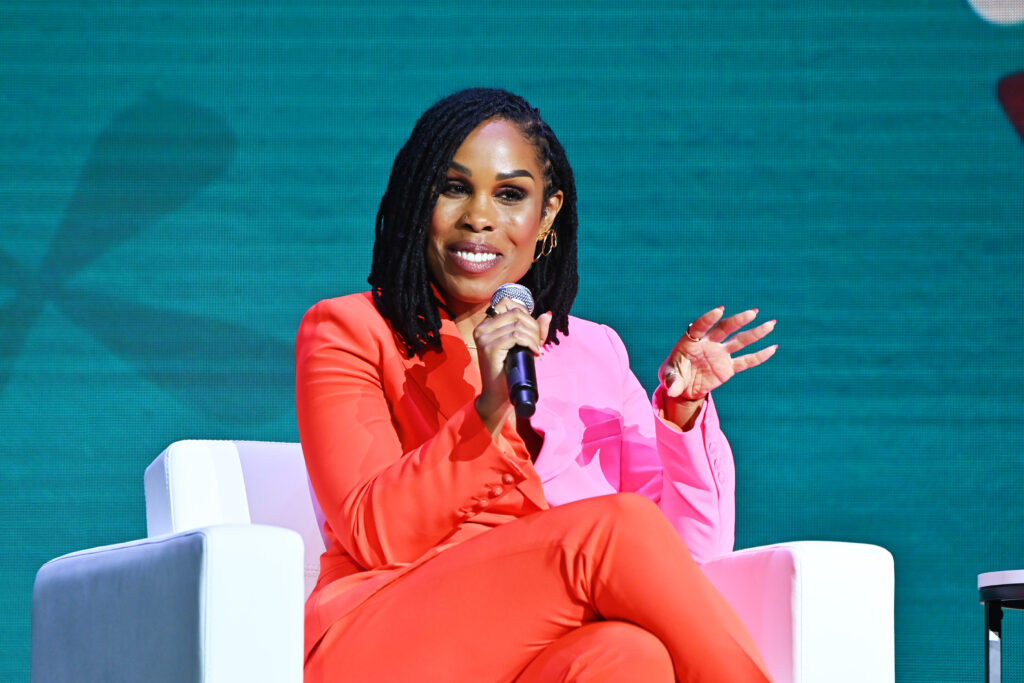
When Uché Blackstock and her twin sister Oni graduated from Harvard Medical School in 2005, they became the school’s first Black mother-daughter legacy—their mother, a practicing physician, had received her medical degree three decades before. In her new book, Legacy: A Black Physician Reckons with Racism in Medicine, Blackstock delves deep into the systemic inequities in health care while paying homage to her late mother. I sat down to talk with her about her new book, being a “first,” and her own legacy.
Rebecca Carroll: The subtitle of your book takes on this idea of “reckoning” around racism, a phrase that has been rampant in public discourse over the past couple of years. What has “reckoning” meant for you?
Uché Blackstock: The subtitle is really a reflection of my own journey from child to medical student to practicing physician. It probably started in my residency, but more so when I was caring for my patients and also dealing with toxic, sexist, and racist environments—and seeing how, as patients and physicians, we get it from both sides.
And then, in 2020, the reckoning that we saw during [that time] gave me an opportunity to delve a little bit deeper into how, despite advances in innovation, technology, and research, we are having worsening health inequities in our communities. Not better.
RC: There's a lot of staggering data and evidence about the impact of racism on health outcomes that you've discovered in your research. What was some of the most surprising?
UB: Black infants are more likely to die in their first year of life now than white infants, than 15 years before the end of slavery. So while the overall infant mortality rates have improved because of childbirth techniques, sanitation, [and] infection control techniques, Black babies are now more than twice as likely than white babies to die in their first year of life.
We know that there was a financial interest in keeping those babies alive during slavery, but we also know now what racism does to our bodies. When Black birthing people are pregnant, that stress actually gets transmitted to our babies. There's something called epigenetics—it's how stress influences gene expression. There's some data that even shows that the stress that enslaved Black women endured has been transferred across generations, and that impacts the infant mortality of Black babies today.
RC: You mentioned unlearning things you were taught during your formal education. How do you do that?
UB: It shouldn't be a process that we have to take upon ourselves. One thing I talk about in the book is a call to action: Medical schools need to think about educating future physicians to adequately and equitably care for Black patients in a world full of anti-Blackness. They have to be very intentional about what the curriculum looks like. It can't just be one training or one workshop.
RC: You write in the book about how your mother always made sure that you and your sister felt good about your Blackness and how you were surrounded by representation, such as Black art and Black books. Can you talk about how that may have shielded you throughout your life?
UB: I grew up thinking that most physicians were Black and that most of them were Black women—my mother, my pediatrician, we had several Black doctors. And my mother was the first Black woman in New York State to get her MD; she [became] the president of the Dr. Susan Smith McKinney Steward Society, [and she] would take me and my sister to these meetings with her. And so, for a very long time, I saw that as a very tangible possibility for me. It really wasn't until I got to college and was pre-med that I looked around and realized that there were not that many of us. And then, in medical school, there really weren’t that many of us. And then looking for my own physicians, [and] having a hard time finding people who look like me, [I recognized] that my experience growing up was such a rarity—it was a blessing, but also a rarity.
You would think that would have protected me from feeling inadequate or out of place. [But] later in my career in academic medicine, I literally got to a point where I felt undervalued and underappreciated. This is what predominantly white institutions do to us.
RC: We place a lot of emphasis on being a “first”—especially being a Black woman first—and it’s always framed as this amazing accolade for us instead of a failure on the part of the system. As a first yourself, what does it feel like to hold that moniker?
UB: I say it in a conflicted way. I say it proudly because I'm very proud of my mother and all that she accomplished…knowing that it wasn't easy for her. But also, there were so many other brilliant Black children like her growing up in central Brooklyn who should have been at Harvard Medical School with her. My sister and I graduated in 2005 and became the first Black mother-daughter legacy at Harvard Medical School. That’s ridiculous. So that speaks to the work that these institutions that are so highly respected still have to do.
RC: What are your thoughts about what happened to Claudine Gay?
UB: I'm devastated as a Black woman, [and] as an alumni of Harvard. What happens—and we see this often as Black women—is that we are put in these positions of power, and then we are not empowered. We're not given the support that we need. I was actually nominated to be the Chief Marshall for my class reunion this May—my 25th reunion at Harvard. But I took my name off the ballot. I emailed them and said, “I don't want to be considered for this because I'm very disappointed in the lack of support that President Gay received from Harvard.” You cannot put us in these positions and then let us flail on our own.
RC: It speaks so succinctly to the way that we, as Black women, have had to exist according to tropes, but when we are put into these positions of power and then try to function in a way that is anti-trope, it becomes very clear that that’s not what we were anointed to do.
UB: Right. Exactly. This is why I left academic medicine. I was handpicked for this DEI role in the Office of Diversity Affairs at NYU. I was so excited. I was like, finally, I'm going to do the work that I want to do. And then come to find out it's a figurehead position. And talk about that whole pet-to-threat [phenomenon], where they bring you in because you've done all these wonderful things, and then you start making these observations about the inequities in the system, and you become a threat. And then they isolate you and make things either so untenable for you that you want to leave, or they ask you to leave. This happens to Black women all the time.
RC: I think among the most frustrating things for those of us who interrogate systemic racism is identifying where there are improvements. Where do you see advancements?
UB: In the book, I talk about this birthing center, the Roots Birthing Center in Northern Minneapolis. And Northern Minneapolis has the worst racial inequities in health in every other area. This birthing center was founded by a Black midwife with the mission of serving Black birthing people with respect and dignity. That is just so simple. But what they've seen in some of the data that's come out from there is that they have had a reduction in pregnancy complications compared to the Minneapolis average.
We need to look at models within our communities that actually are working. How can we support them? How can we give them more funding? We see that redlined neighborhoods correlate with the worst health outcomes. And so on a neighborhood level, if we can look at what we call the social determinants of health—education, housing, employment, and access to healthy foods, just like creating an environment in Black communities where Black people can thrive—that actually makes a difference.
RC: And also just being in community with each other.
UB: That's a great point.
RC: And now that you are a mother, how does it feel to be passing on your own legacy?
UB: My kids are seven and nine. I have two boys. Even though they're not really clear about what I do, they know that I'm trying to make life healthier for Black people. I would just love for my children to be able to live long, full lives, and if I can help contribute to that in some way, that makes me happy.






